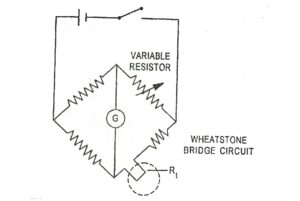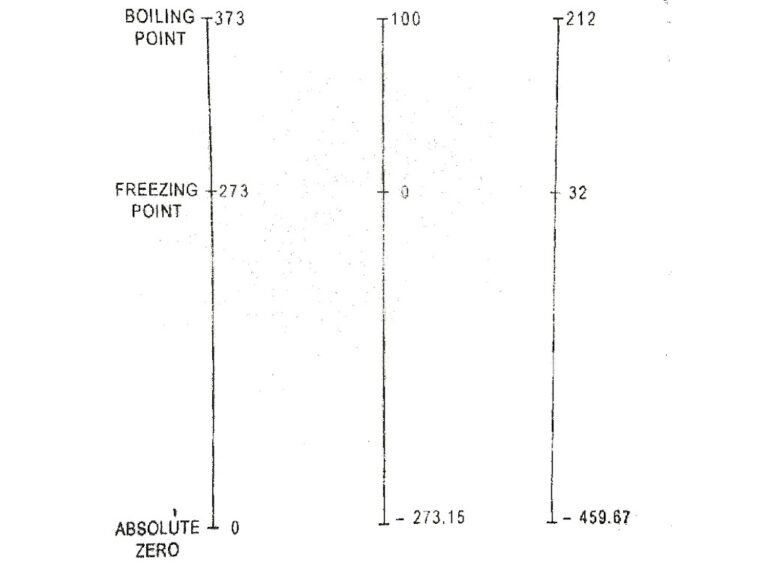Electrical Resistance Thermometer :
Electrical resistance thermometer give accurate measurement of temperature. It is very sensitive and is suitable as a standard for calibration of other thermometers.
In electrical resistance thermometer the change in the resistance of metallic (platinum) wire due to change in temperature is the thermometric property.
The resistance of wire at any temperature is given by the relation,
Rt = R0 (1 + At + Bt2)
Where R0 = resistance of platinum wire at ice point
A and B = constants
If Rt is determined, then the temperature may be calculated by using the relation.
t°C/t100 = [(Rt – R0)/(R100 – R0)]
t°C = 100 [(Rt – R0)/(R100 – R0)]
 |
| Fig.1 Resistance Thermometer |
The platinum wire incorporated in a wheat stone bridge circuit is shown in Fig.1. Variable resistor is adjusted so that the bridge is balanced i.e., the galvanometer shows zero readings; when there is a change in resistance of platinum wire, then the circuit flows through the galvanometer and pointer deflect on the dial which is calibrated to read temperature directly.
Thermocouple
Thermocouple circuit is made of two dissimilar metal wire X and y as shown in Fig.2. An e.m.f is generated in the circuit when two ends of wires are joined at each end, and junctions are maintained at different temperatures. This e.m.f is directly proportional to the temperature difference and if one temperature (reference point-cold junction) is known, measurement of e.m.f will give the temperature of other end (hot junction) which is to be measured.
 |
| Fig.3 Thermocouple |
The circuit current due to e.m.f and developed can be measured by galvanometer and can be calibrated to indicate the hot-junction temperature. the e.m.f generated may be correlated with temperature by the following equation.
E = a + bt + ct2 + dt3
where E = e.m.f generated
a, b, c and d = constant which depend on thermocouple metals.
The choice of metals for thermocouple depends on the temperature range to be measured. Important thermocouple metals with their temperature range are given in table 3
Thermocouple metals
|
Thermocouple metals
(Positive – negative polarities
|
Temperature range
|
|
Copper – constants
Iron – constants
Chromed – alumel
|
-120°C to 250°C
-20°C to 650°C
40°C to 1250°C
|
Table 3
The mass of thermocouple is small, and it comes to thermal equilibrium with the system whose temperature is to be measured. Further, the temperature readings can be read directly.






Nice blog, I will keep visiting this blog very often. Electrical Contractor